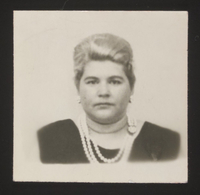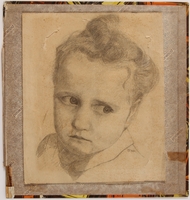Overview
- Interviewee
- Ms. Barbara Cohen
- Date
-
interview:
2001 October 23
- Credit Line
- United States Holocaust Memorial Museum Collection, Gift of Barbara Cohen
Physical Details
- Extent
-
1 sound cassette (60 min.).
Rights & Restrictions
- Conditions on Access
- There are no known restrictions on access to this material.
- Conditions on Use
- No restrictions on use
Administrative Notes
- Legal Status
- Permanent Collection
- Provenance
- Barbara Cohen donated her oral history interview to the United States Holocaust Memorial Museum June 9, 2013. The interview was recorded on an audio cassette tape October 23, 2001.
- Special Collection
-
The Jeff and Toby Herr Oral History Archive
- Record last modified:
- 2023-11-16 09:29:58
- This page:
- https://collections.ushmm.org/search/catalog/irn74816
Download & Licensing
- Request Copy
- See Rights and Restrictions
- Terms of Use
- This record is digitized but cannot be downloaded online.
In-Person Research
- Available for Research
- Plan a Research Visit
Contact Us
Also in Barbara Schechter Cohen family collection
The collection consists of a pencil portrait, a knitted vest, documents, photographs, and oral histories relating to the experiences of Basha Schachter and her parents Filip and Janina during the Holocaust in Poland and Germany when they lived in hiding under assumed identities, and after the Holocaust in displaced persons camps in Germany.
Date: approximately 1932-1946

Josepha Lanzinger collection
Document
Consists of material related to the experiences of Josepha (Josefa, Josefine) Lanzinger, born in Augsburg in 1929. Includes a 1959 reissue of her birth certificate, a 1946 certificate on completion of an apprenticeship in Würzburg, a November 1946 report card, a small photograph of Josepha, and two photographic negatives, one of a small girl, one of a group of people, significance unknown. The donor believes that Josepha was hidden in a convent during the Holocaust.

Pencil portrait of a former Jewish Polish hidden child done in DP camp
Object
Llifelike pencil portrait of 4 year old Basha Schaechter done in 1946 when she lived in Stuttgart displaced persons camp with her parents, Filip and Janina. Basha was born in September 1941 in Bukaczowce, Poland, where her parents were living under false papers as Christians, Frank and Janina Rogalski. Just before Basha's birth, the village, which was in Soviet territory, was occupied by German troops. The family fled to a village near Krakow. Around summer 1942, their landlord said he knew they were Jewish, and that he would not report them, but they must leave. They decided it was safer to separate, since Jean and Basha, both blue-eyed blondes, did not look Jewish. Janina took Basha and went to Germany as a Polish forced laborer. She found work at an inn in Durnholz, Germany, and placed Basha with a Christian woman, Berta Antleman. Janina visited occasionally, but not as her mother, and Basha did not remember her. In spring 1945, as rumors spread that the war was ending, Janina said she would be leaving with Basha, but Berta said the child would remain with her. In April 1945, Janina asked to take Basha for a walk, and then ran away with her. They went to Stuttgart displaced persons camp in Germany. They were soon reunited with Filip, who had worked as a Polish forced laborer in Pulsnitz, Germany. The family sailed to New York in May 1946 on the SS Marine Flasher.
Child's blue striped sweater vest worn by a former hidden child on her arrival to the US
Object
Blue striped knit vest worn by 4 year old Basha Schaechter when she arrived in New York in May 1946 on the SS Marine Flasher. Basha was born in September 1941 to Filip and Janina, who were living under false papers as Christians, Frank and Janina Rogalski. Just before Basha's birth, the village, which was in Soviet territory, was occupied by German troops. The family fled to a village near Krakow. Around summer 1942, their landlord said he knew they were Jewish, and that he would not report them, but they must leave. They decided it was safer to separate, since Jean and Basha, both blue-eyed blondes, did not look Jewish. Janina took Basha and went to Germany as a Polish forced laborer. She found work at an inn in Durnholz, Germany, and placed Basha with a Christian woman, Berta Antleman. Janina visited occasionally, but not as her mother, and Basha did not remember her. In spring 1945, as rumors spread that the war was ending, Janina said she would be leaving with Basha, but Berta said the child would remain with her. In April 1945, Janina asked to take Basha for a walk, and then ran away with her. They went to Stuttgart displaced persons camp in Germany. They were soon reunited with Filip, who had worked as a Polish forced laborer in Pulsnitz, Germany.
Oral history interview with Philip Schechter
Oral History
Oral history interview with Jean Schechter
Oral History



